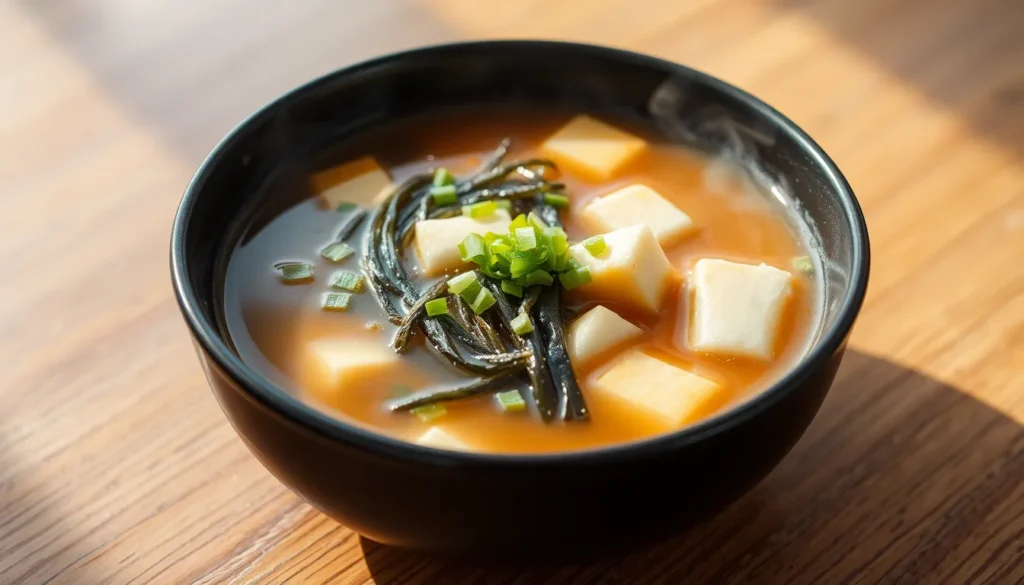Miso soup might not be the first thing that comes to mind when thinking of a low-calorie meal, but it sure knows how to pack a flavorful punch without packing on the pounds. Imagine slurping down a warm bowl of umami goodness that’s not only comforting but also a friend to your waistline. Who knew a humble bowl of soup could be so delightful?
But just how many calories are in this Japanese staple? Spoiler alert: it’s less than you might think! From its savory miso base to the delicate tofu and seaweed, miso soup offers a delicious way to nourish your body without feeling guilty. So grab your chopsticks and let’s dive into the calorie count of this beloved dish, because knowing what’s in your food is always a win.
Table of Contents
ToggleOverview of Miso Soup
Miso soup serves as a comforting and nutritious Japanese dish. This flavorful soup delivers a satisfying experience while maintaining a low-calorie profile.
What is Miso Soup?
Miso soup consists of a broth made primarily from miso paste, which is fermented soybean paste. Lightly seasoned, this soup offers a savory umami flavor. Traditionally, it accompanies various meals in Japanese cuisine. Chef-prepared variations may include additional ingredients for enhanced taste and texture. People enjoy miso soup for breakfast, lunch, or dinner, showcasing its versatility.
Key Ingredients in Miso Soup
Miso paste, tofu, and seaweed form the primary components of miso soup. Miso paste contributes essential flavors and nutrients. Tofu provides a source of protein, while seaweed adds minerals and additional flavor. Sometimes, scallions, mushrooms, and vegetables appear in recipes to elevate nutritional content. Combining these ingredients results in a delicious and healthful dish.
Nutritional Profile of Miso Soup

Miso soup offers a balanced nutritional profile that supports a healthy diet. This traditional Japanese dish is low in calories yet rich in flavor, making it a popular choice for many.
Calories in Miso Soup
One cup of miso soup contains approximately 40 to 65 calories, depending on specific ingredients and preparation methods. The caloric content can fluctuate based on the amount of miso paste and any added components like tofu or vegetables. Specific recipes may cause variations, but miso soup generally remains a satisfying, low-calorie option.
Macronutrients Breakdown
Miso soup provides essential macronutrients that contribute to overall wellbeing. A typical serving contains around 2 to 3 grams of protein, mainly from tofu. Carbohydrate content usually ranges from 5 to 7 grams, depending on added ingredients. Fat content remains low, often around 1 to 3 grams, which is primarily due to the use of miso paste. This combination promotes a nutritious meal that supports dietary needs without excessive calorie intake.
Factors Affecting Caloric Content
Caloric content in miso soup can vary based on several factors, particularly ingredient choices and serving size.
Variations in Ingredients
Different ingredients contribute to the soup’s overall caloric profile. Miso paste, the primary ingredient, contains approximately 35 to 45 calories per tablespoon. Tofu adds additional calories, with a 1/2 cup providing about 90 calories. Seaweed typically adds minimal calories, ranging from 5 to 20 depending on the type and amount used. Optional ingredients like mushrooms and scallions can enhance flavor with negligible calorie additions. Variations such as using low-sodium broth or adding vegetables further modify the calorie count. Overall, ingredient combinations dictate the total caloric intake.
Portion Sizes
Serving sizes significantly affect the caloric content of miso soup. A standard cup, about 240 milliliters, usually contains 40 to 65 calories. Considering larger portions, calories increase proportionally. For instance, a 16-ounce serving might contain 80 to 130 calories. It’s essential to measure the ingredients accurately, especially when making bulk servings. Individual preferences or dietary needs can also influence how much soup is consumed. Ultimately, portion sizes directly correlate to overall calorie consumption.
Health Benefits of Miso Soup
Miso soup offers numerous health benefits, making it a valuable addition to any diet.
Probiotics and Digestion
Probiotics found in miso soup improve gut health significantly. These beneficial bacteria aid digestion and help maintain a balanced microbiome. Fermentation of the miso paste enhances probiotic content, which can support overall digestive wellness. Consuming miso soup regularly can alleviate symptoms of gastrointestinal discomfort. It’s worth noting that the soup offers a comforting option, promoting hydration and easing digestive processes.
Nutrient Density
Miso soup stands out for its nutrient density. Each bowl provides essential vitamins and minerals, contributing to a balanced diet. Miso paste, tofu, and seaweed deliver antioxidants, protein, and trace elements. A serving delivers calcium from tofu and iodine from seaweed, both important for various bodily functions. Including vegetables like mushrooms and scallions further enhances nutrient content, promoting overall health. Each ingredient enhances the soup’s profile, making it not just low in calories but high in nutrition.
Miso soup stands out as a nutritious and low-calorie option that offers a delightful taste experience. With its rich umami flavor and versatile ingredients, it’s a dish that can fit seamlessly into various meals throughout the day. The balance of protein from tofu and essential minerals from seaweed enhances its appeal while keeping calorie counts low.
Understanding the calorie content and health benefits of miso soup allows individuals to make informed dietary choices. Whether enjoyed on its own or as part of a larger meal, miso soup proves to be a satisfying addition to a balanced diet. Embracing this traditional Japanese dish can lead to both culinary enjoyment and improved wellness.




